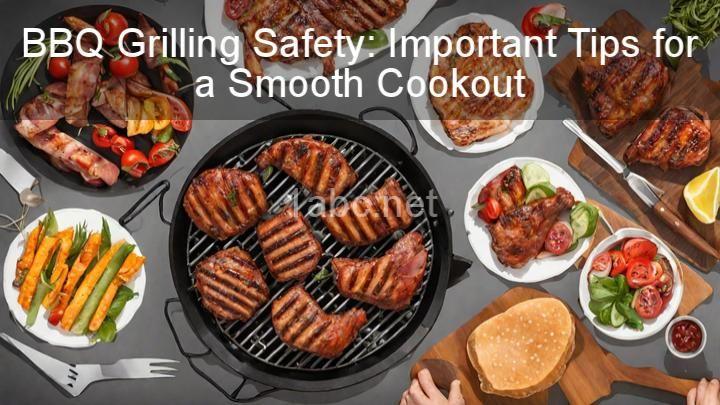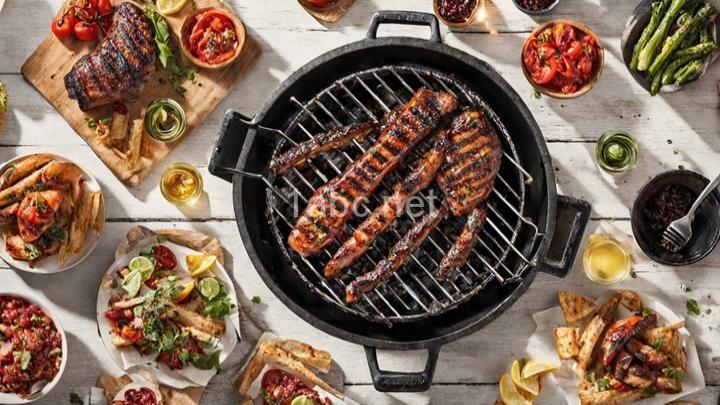BBQ Grilling Safety: Important Tips for a Smooth Cookout

I. Introduction
A. The joy of summertime brings with it the opportunity for outdoor gatherings, delicious food, and of course, barbeque grilling. However, it's essential to prioritize safety to ensure a smooth and enjoyable cookout. In this blog post, we will provide you with valuable tips and guidelines to help you practice BBQ grilling safety.
B. Let's dive into these important safety measures and make sure your next cookout is not only delicious but also incident-free.
II. Preparing Your Grill
A. Clean and inspect your grill before use
1. Before firing up your grill, it's crucial to clean it thoroughly. Remove any grease, debris, or remnants from previous cookouts. Not only does this ensure better-tasting food, but it also reduces the risk of flare-ups or accidental fires.
2. Regular maintenance of your grill is vital to ensure its longevity and safe operation. Cleaning the grates, burners, and other components on a regular basis will prevent the buildup of grease and residue.
B. Check for gas leaks (for gas grills)
1. For those using gas grills, it is important to check for gas leaks before each use. A simple leak test can be performed by applying a soapy water solution to the gas connections. If bubbles form, it indicates a leak. In such cases, it is crucial to address the issue promptly by tightening connections or replacing faulty parts.
2. Neglecting to address gas leaks can lead to hazardous situations, including fires or gas explosions. Safety should always be the top priority when it comes to grilling.
III. Location and Setup
A. Choose an appropriate grilling location
1. Grilling indoors or in enclosed spaces is extremely dangerous due to the risk of carbon monoxide poisoning. To avoid this, always grill in well-ventilated outdoor areas.
2. It is important to set up your grill in a safe location, away from any flammable objects or structures. Avoid grilling under overhangs or near trees, shrubs, or buildings. Keeping a safe distance from any potential fire hazards is essential for a safe cookout.
B. Ensure proper ventilation while grilling
1. Adequate ventilation is crucial while grilling to prevent the buildup of smoke and carbon monoxide. Ensure that there is enough open space around the grill for proper airflow.
2. Additionally, make sure that the grill is not positioned too close to any structures or buildings. Maintaining a safe distance will minimize the risk of accidental fires spreading.
IV. Fire Safety Measures
A. Keep a fire extinguisher nearby
1. In case of any fire emergencies, it is essential to have a fire extinguisher readily available. Look for fire extinguishers suitable for kitchen fires, such as those labeled ABC. Familiarize yourself with their usage instructions before an emergency arises.
2. Remember the acronym PASS: Pull the pin, Aim at the base of the fire, Squeeze the handle, and Sweep from side to side. Knowing how to use a fire extinguisher effectively can save lives and prevent property damage.
B. Make sure you know how to handle flare-ups
Flare-ups are a common occurrence while grilling, especially when cooking fatty meats. It is important to know how to manage flare-ups safely to prevent accidents or injuries. a. Adjusting heat levels is crucial when dealing with flare-ups. Reduce the heat or move the food away from the direct flame to allow the excess fat to burn off without causing a dangerous situation.
V. Food Handling and Cooking Safety
A. Practice proper food handling techniques
1. When it comes to food safety, it is crucial to follow proper handling techniques. Always wash your hands thoroughly before and after handling raw meat to prevent cross-contamination.
2. It's important to separate raw and cooked foods to avoid the risk of foodborne illnesses. Use separate cutting boards and utensils for raw and cooked foods to prevent bacteria from spreading.
B. Cook meats thoroughly to avoid foodborne illnesses
1. Different types of meat require specific internal temperatures to ensure they are cooked thoroughly and safe to eat. Invest in a reliable meat thermometer to accurately measure the internal temperature of your meat.
2. For example, chicken should be cooked to an internal temperature of 165°F (74°C), while ground beef should reach 160°F (71°C). By following these temperature guidelines, you can minimize the risk of foodborne illnesses and ensure a safe cookout.
VI. Children and Pet Safety
A. Ensure a safe environment for children and pets
1. Grilling can be an exciting experience for children, but it's important to keep them away from the grilling area. Supervision is crucial to prevent accidents or burns.
2. Similarly, pets should be kept at a safe distance from the grill. The enticing smells of barbequed food can attract curious pets, leading to potential accidents or injuries.
VII. Clean up and Maintenance
A. Properly clean and store your grill after use
1. After the cookout, it is important to clean your grill thoroughly. Cleaning the grates, burners, and other components will prevent the buildup of grease and residue, which can be a fire hazard.
2. Once cleaned, store your grill in a dry and secure place, such as a shed or garage. Protecting your grill from the elements will ensure its longevity and safe operation for future cookouts.
VIII. Conclusion
A. BBQ grilling safety should always be a priority to ensure a successful and incident-free cookout. By following the tips and guidelines provided in this blog post, you can enjoy delicious food and create lasting memories with friends and family.
B. Remember, safety is not something to be taken lightly. By implementing these safety measures and practicing responsible grilling, you can ensure a smooth and enjoyable cookout experience for everyone involved. Happy grilling!
FREQUENTLY ASKED QUESTIONS
How can I ensure BBQ grilling safety?
To ensure B
BQ grilling safety, here are some important tips to follow:
- Choose a safe location: Set up your grill in a well-ventilated outdoor area away from any flammable materials, such as buildings, trees, and overhanging branches.
- Keep the grill stable: Place your grill on a flat and sturdy surface to avoid any tipping or accidental fires.
- Check for gas leaks: If you have a gas grill, regularly inspect the gas hose and connections for any leaks. Apply a soapy water solution to the connections and if you see bubbles forming, there might be a leak which needs to be fixed before use.
- Keep a fire extinguisher nearby: Have a fire extinguisher within reach in case of emergencies. Make sure you know how to use it properly.
- Keep children and pets away: Ensure that children and pets are at a safe distance from the grill to prevent accidents or burns. Establish a "no play zone" around the grilling area.
- Use proper grilling tools: Utilize long-handled tools specifically designed for grilling to avoid getting too close to the flames. This includes tongs, spatulas, and brushes.
- Avoid loose clothing: Wear suitable clothing while grilling, ensuring that you avoid loose sleeves or any other material that may catch fire easily.
- Be mindful of flare-ups: Trim excess fat from meat to minimize flare-ups. If a flare-up does occur, move the food away from the flames temporarily until it subsides.
- Use a meat thermometer: Ensure that meats are cooked to the appropriate temperatures to prevent foodborne illnesses. Refer to a temperature guide for specific guidelines.
- Clean the grill regularly: Regularly cleaning your grill will help prevent grease buildup, which can lead to fires. Remember to clean the grates before and after each use.
By following these safety tips, you can enjoy a safe and enjoyable BBQ grilling experience.
What are the essential safety tips for a smooth cookout?
Here are some essential safety tips for a smooth cookout:
- Choose a safe location: Set up your grill in a well-ventilated outdoor area, away from any flammable objects like trees or buildings.
- Check for gas leaks: Before using a gas grill, make sure to check the gas tank and connections for any leaks. Apply a solution of soapy water to the connections and look for bubbles – if you spot any, there may be a leak.
- Keep a fire extinguisher nearby: It's important to have a fire extinguisher within reach in case of emergencies. Make sure you know how to operate it, and that it is rated for all types of fires.
- Supervise the grill at all times: Never leave a lit grill unattended, as it can pose a fire hazard. Assign someone to monitor the grill while it's in use.
- Keep children and pets away: Create a designated safe zone around the grill and make sure children and pets are not allowed to play or get too close to it.
- Use long-handled grilling tools: To avoid burns, use long-handled tools specifically designed for grilling, keeping your hands and arms at a safe distance from the heat.
- Practice proper food handling: Prevent foodborne illnesses by cleaning all surfaces and utensils before and after use. Keep raw and cooked foods separate, and use separate cutting boards and utensils for each.
- Use a meat thermometer: Ensure that meat is cooked thoroughly by using a meat thermometer. This will help prevent food poisoning and ensure food safety.
- Dispose of coals safely: Allow coals to cool completely after use before disposing of them in a metal container. Do not dispose of them in plastic bags or bins.
- Keep a first aid kit handy: Accidents happen, so it's wise to have a well-stocked first aid kit nearby in case of minor injuries.
Remember, safety should always be a top priority when enjoying a cookout.
Is it important to clean the grill before using it?
Yes, it is important to clean the grill before using it. Cleaning the grill ensures that any leftover food particles, grease, or debris from previous use are removed. This not only helps to prevent any unwanted flavors from transferring to your food but also helps to prevent flare-ups or potential fire hazards. Regular cleaning also helps to extend the lifespan of your grill and keep it functioning properly.
